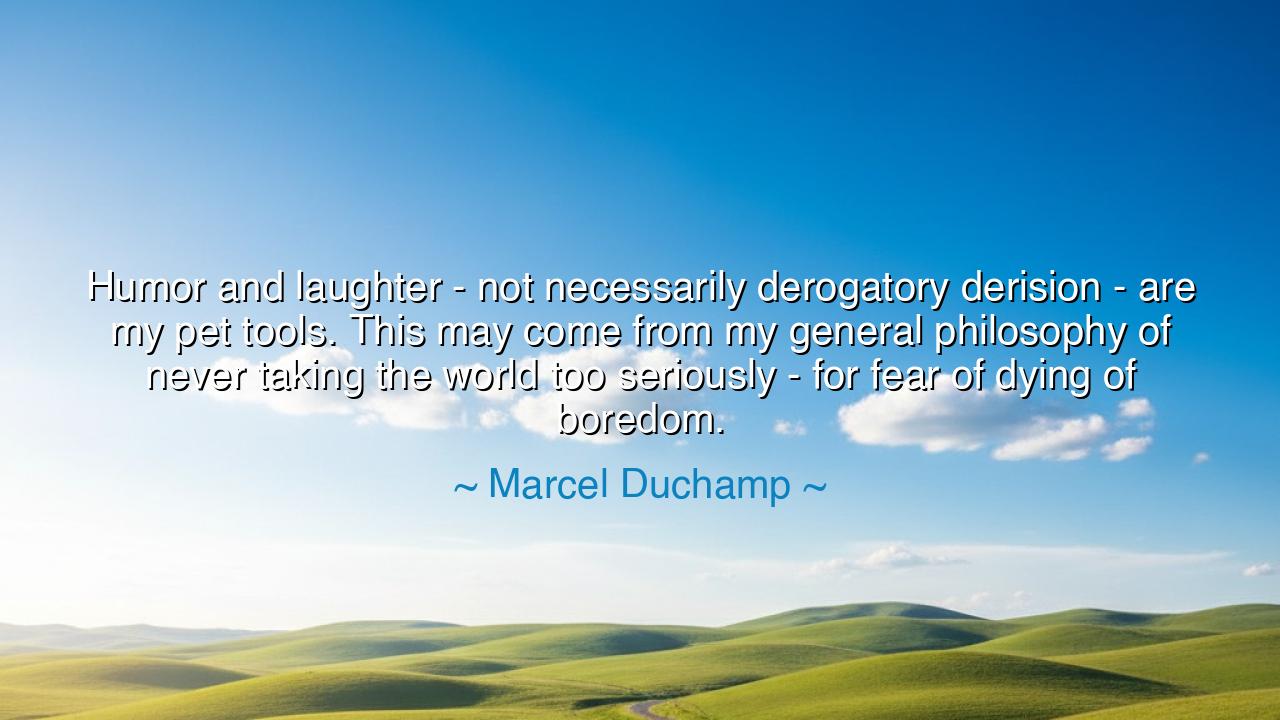
Humor and laughter - not necessarily derogatory derision - are my
Humor and laughter - not necessarily derogatory derision - are my pet tools. This may come from my general philosophy of never taking the world too seriously - for fear of dying of boredom.






When Marcel Duchamp said, “Humor and laughter — not necessarily derogatory derision — are my pet tools. This may come from my general philosophy of never taking the world too seriously — for fear of dying of boredom,” he was revealing a profound philosophy that blends the mind of the artist with the heart of the sage. Duchamp understood that the world is vast, strange, and often absurd, and that to survive its weight with one’s spirit intact, one must wield humor and laughter as tools of liberation. Not as weapons of mockery, but as instruments of light — chisels that carve through the stone of solemnity, revealing the hidden joy beneath.
The ancients often spoke of the virtue of temperance, of moderation in all things, yet Duchamp extends this wisdom to the domain of perception and creativity. To never take the world too seriously is to see the theater of life in its full dimension: tragedy and comedy intertwined, folly and wisdom dancing together. Humor, in this sense, becomes a sacred act — the acknowledgment that no matter how grand or grim the circumstance, the human spirit retains the freedom to respond with delight, with play, and with invention. Laughter becomes a declaration of independence from the tyranny of despair.
Duchamp’s “pet tools” — humor and laughter — were central not only to his life, but to his art. In creating works like Fountain, the urinal he signed and submitted as art, he challenged centuries of tradition with a smile. The world might have bristled at his audacity, but Duchamp laughed in the face of convention, revealing the absurdity of what is considered sacred or serious. Through this act, he taught that laughter is not superficial, but a profound lens for perceiving truth — the ability to question, subvert, and transform with elegance and levity.
Consider the example of Diogenes of Sinope, the ancient cynic who lived in a barrel and mocked kings and philosophers alike. His laughter was not derision for cruelty, but insight expressed through wit. He dared to expose the pretense of society while remaining free from its constraints. Duchamp’s approach mirrors this philosophy: humor as a liberating force, laughter as a declaration of sovereignty over the world’s absurdities. In both cases, the sage or artist employs levity not to diminish life, but to reveal it, to puncture rigidity, and to celebrate the unexpected.
Duchamp also warns of the danger of excessive solemnity. To take the world too seriously is to risk stagnation, to “die of boredom,” as he puts it. This is not idle exaggeration. When the mind and spirit are weighed down by unrelenting gravity, creativity withers, insight fades, and life itself loses vitality. Humor restores equilibrium. It is the spring that renews the soul, the light that restores curiosity, the laughter that reminds us that existence is playful, strange, and full of possibilities. Even in hardship, laughter preserves wonder.
In practical terms, Duchamp’s philosophy can guide modern life. When faced with rigid systems, social expectation, or the repetitive tedium of daily existence, one may adopt humor as a tool — not to escape, but to transform perception. When encountering absurdity or misfortune, respond with curiosity and play. When overwhelmed by solemnity, remember that levity is not a triviality, but a survival strategy. The world, in its endless complexity, rewards those who can see both the gravity and the folly, and who respond with laughter that illuminates rather than diminishes.
The lesson, then, is eternal: wield humor with discernment, embrace laughter with courage, and resist the tyranny of taking all things too seriously. By doing so, one preserves both creativity and joy. As Duchamp demonstrates, life’s absurdities are not to be feared, but to be engaged with, explored, and, ultimately, celebrated. Humor is not merely amusement; it is a philosophy, a tool of liberation, and a shield against the stagnation of the soul.
In the end, Marcel Duchamp teaches us that to laugh at the world is not to mock it, but to master it. Humor and laughter, when wielded as he describes, are not ephemeral pleasures but eternal instruments of insight and freedom. To live fully, one must embrace these tools, allowing levity to sharpen perception, awaken creativity, and maintain dignity. For in the dance of the absurd, those who wield laughter wisely become invincible — not in strength, but in spirit.






AAdministratorAdministrator
Welcome, honored guests. Please leave a comment, we will respond soon